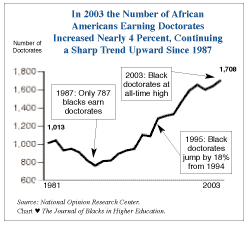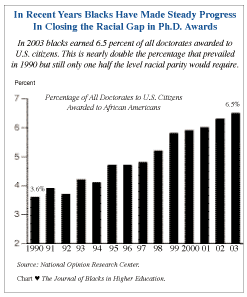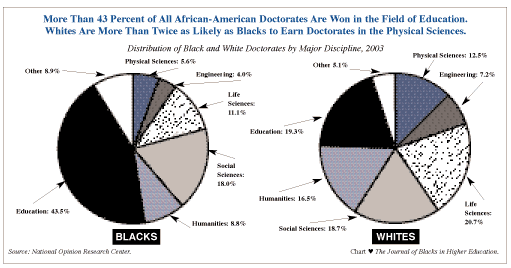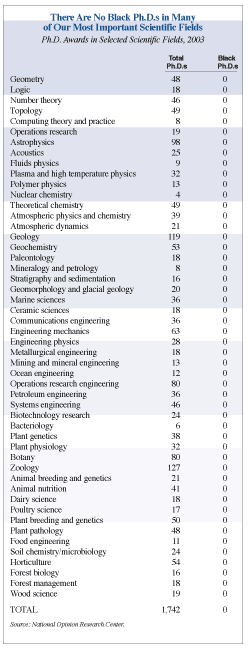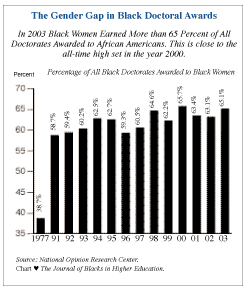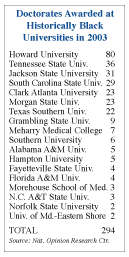| Good News! A Record Number of Doctoral Degrees Awarded to African Americans More than 1,700 African Americans earned doctoral degrees in 2003. This number has increased nearly 4 percent from a year ago. Black doctorates are now at the highest level in history.
Readers of JBHE often tell us that the statistics they read
in our journal on the progress of blacks in higher education leave
them depressed. But this is not a fair statement of the news we
tell. In recent issues we have reported on the excellent black
student graduation rates at highly selective colleges and
universities, the near economic parity achieved by
college-educated blacks compared to college-educated whites, and
the steady overall increase of blacks enrolled in college and
graduate schools.
Now we report good news on doctoral awards to African Americans. Here the progress is strong. And it is proceeding at an encouraging rate. A new report prepared by the National Opinion Research Center at the University of Chicago finds that 1,708 African Americans earned doctorates in 2003. This was an increase of 4 percent from 2002. The number of black doctorates in 2003 eclipsed the previous high annual total of 1,656 set in the year 2000. In 2003 blacks made up 6.5 percent of all doctorates awarded to American citizens. The overall progress during the past 16 years is solid. In 1987, only 787 African Americans earned doctorates. This year's total of 1,708 doctorates is nearly 2.2 times as many as were earned in 1987. In 1990 the black share of all doctoral awards was 3.6 percent. That has now grown to 6.5 percent, a showing of significant progress in a relatively short period of time. Although African Americans
have made solid progress in doctoral awards, much remains to be
achieved. In 2003 African Americans were nearly 13 percent of the
U.S. population. Therefore, black doctoral awards were earned at
only one half the level that racial parity would call for.
Major Shortfalls in the Natural Sciences There continue to be wide differences among blacks and whites in terms of the academic fields in which they earn doctorates. For instance, 43.5 percent of all doctorates awarded to African Americans in 2003 were in the field of education. In contrast, only 19.3 percent of doctorates earned by whites were in this field. This large percentage of all black doctorates in the field of education has been the case for decades with only minor fluctuations. Whites are far more likely than blacks to earn doctorates in the natural sciences. In 2003, 12.5 percent of doctorates awarded to whites were in the physical sciences, more than double the percentage for African Americans, which stands at 5.6 percent. The percentage of all black doctorates that were awarded in the natural sciences declined from 2002 to 2003. The very large racial Ph.D. gap in the natural sciences is striking when we examine black Ph.D. awards in specific disciplines. For example, in 2003 African Americans earned only 16 doctorates in mathematics. This was only 1.6 percent of all doctorates awarded in the field. Blacks earned 1 percent of all doctorates in
physics and astronomy. In computer science, blacks won 2 percent
of all Ph.D. awards. In chemistry, only 2.1 percent of Ph.D.s went
to blacks. In the earth sciences such as geology, oceanography,
and the atmospheric sciences, blacks were 2.3 percent of all
doctoral recipients. In the biological sciences, 108 African
Americans were awarded a Ph.D. in 2003. But they were only 1.9
percent of all doctorates awarded in the discipline.
Blacks also trail whites by a large margin in Ph.D.s in engineering. In 2003, 7.2 percent of all white doctorates were earned in the field of engineering. For blacks, only 4 percent of all their doctorates were in engineering. Blacks earned a mere 1.4 percent of all engineering Ph.D.s. The racial gap in engineering Ph.D.s expanded from 2002 to 2003. Whites also held a large lead over blacks in Ph.D.s in the humanities. For whites, 16.5 percent of their doctorates were in the humanities. This is almost double the percentage of all black doctorates that were awarded in the humanities. Almost No Awards to African Americans A strong indicator of the fact that
African Americans as a group continue to avoid many of the natural
sciences appears in the statistics for specific disciplines. In
2003, 1,742 doctorates were awarded by universities in the United
States in the fields of geometry, logic, number theory, topology,
computing theory and practice, operations research, astrophysics,
acoustics, fluids physics, plasma and high temperature physics,
polymer physics, nuclear chemistry, theoretical chemistry,
atmospheric physics and chemistry, atmospheric dynamics, geology,
geochemistry, paleontology, mineralogy and petrology, stratigraphy
and sedimentation, geomorphology and glacial geology, marine
sciences, ceramic sciences, communications engineering,
engineering mechanics, engineering physics, metallurgical
engineering, mining and mineral engineering, ocean engineering,
operations research engineering, petroleum engineering, systems
engineering, biotechnology research, bacteriology, plant genetics,
plant pathology, botany, zoology, animal breeding and genetics,
animal nutrition, dairy science, poultry science, plant breeding
and genetics, plant physiology, food engineering, soil
chemistry/microbiology, horticulture, forest biology, forest
management, and wood science. Not one of these degrees went to an
African American.
The Gender Gap in Black Ph.D. Awards As is the case in almost every measure of African-American higher education, black women have come to hold a large lead in doctoral awards. As recently as 1977, black women earned only 38.7 percent of all doctorates awarded to African Americans. By 2000 black women earned 65.7 percent of all doctorates awarded to African Americans. This is the highest percentage of African-American doctoral awards earned by women in U.S. history. Black men narrowed the gap in both 2001 and 2002. But in 2003 black women upped their percentage of all doctorates earned by African Americans to 65.1 percent, just short of the all-time high. Since 1990 African-American women have increased their number of Ph.D. awards from 550 to 1,112. This is an increase of 102 percent. In contrast, the number of Ph.D. awards to African-American men increased from 351 in 1990 to 596. This is a rise of 69.8 percent. Here are further facts on doctoral awards to blacks contained in the most recent survey on doctorates issued by the National Opinion Research Center at the University of Chicago: • The average age of a black Ph.D. recipient in
2003 was 37.4 compared to 33.9 for all Americans. Doctorates Awarded by Historically Black Universities In 2003 historically black colleges and universities awarded 294 doctorates to recipients of all races. This was down from 300 doctoral awards in 2002. Howard University awarded 80 doctorates, the most of any black university. The Howard total was up two from a year ago. Tennessee State University awarded 36 doctoral degrees in 2003. This was down from the 52 doctorates the university bestowed in 2002. Jackson State University, Clark Atlanta University, Texas Southern University, South Carolina State University, and Morgan State University were the only other black universities to award at least 10 doctorates in 2003. Nationwide, about 15 percent of all doctorates awarded each year are in the physical sciences. But data from the National Opinion Research Center at the University of Chicago shows that only four of the 294 doctorates awarded at historically black colleges and universities in 2003 were in these fields. Three of the five doctorates awarded at Hampton University were in physics. The black universities gave out only one doctoral degree in mathematics. In 2003, 11 doctorates were awarded in
engineering at black universities. Five of these were awarded at
Morgan State University in Maryland.
There were five doctorates awarded in chemistry from historically black universities and three of these were earned at Howard University. Most of the doctorates awarded by black universities were in the social sciences and education, with a large majority of these in the field of education. At South Carolina State University, 29 doctorates were awarded in 2003. All but one were in the field of education. | |




